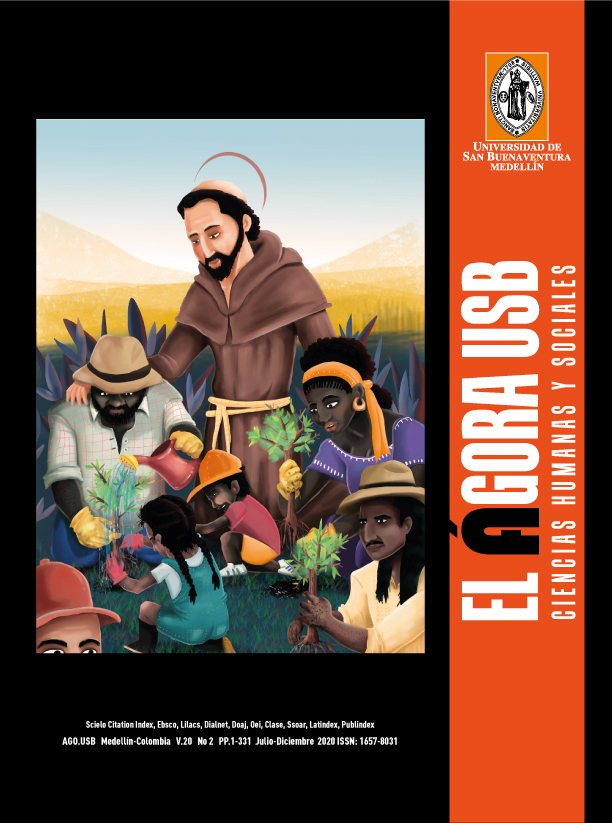The authors are also adhere to the creative commons license 4.0 (https://creativecommons.org/licenses/by-nc-nd/4.0/deed.es)
Attribution - NonCommercial - SinDerivar 4.0 International (CC BY - NC - ND 4.0)
Abstract
Some Senior Citizens in Reintegration Processes (PPRM), who participated in war have mental disturbances explained by the long de-schooling and living situations, which decrease the possibility of accessing the workforce and society. Altered cognitive functioning was more prevalent in people without formal education, without a partner, or living in non-functional families. Among the PPRM demographic factors of PPRM, which increase the likelihood of having a depressive symptom was belonging to the male sex, being over 65 years old, not having support from a partner. This likelihood decreases if there is any degree of schooling. Among the family and social factors discussed, only living with a non-functional family was found to increase the risk of depressive symptoms. Thus, accompaniment is required for the acceptance of their aging process, the use of experiences, and the exercise of citizenship.
References
Agencia Colombiana para la Reintegración. (24 de junio de 2016). Resolución número 1356 de 2016. Obtenido de https://www.ambitojuridico.com/BancoMedios/Documentos%20PDF/res-1356-16(acr).pdf
Agencia Colombiana para la Reintegración. (25 de julio de 2013). Resolución 0754 de 2013. Obtenido de https://diario-oficial.vlex.com.co/vid/sticas-beneficios-desmovilizada-rdida-450907002
Amar J., Llanos R., Ávila-Toscano J., Orozco C. (2011). Relación entre redes personales y calidad de vida en individuos desmovilizados del conflicto armado colombiano. Univ Psychol. 10(2), 355.
Aristizábal E., Howe K., & Palacio J. (2009). Vulneración psicológica en víctimas y victimarios por efecto del conflicto armado en Magdalena, Atlántico, Cesar-Guajira, Sucre y Bolivar. Revista de Psicología Universidad de Antioquia, 1(2), 7–25.
Baldovino M. (2014). Prevalencia de estrés postraumático y trastorno antisocial de la personalidad en la población desmovilizada de las guerrillas colombianas en Bogotá, D.C. [Tesis de maestría]. Bogotá: Universidad Católica de Colombia.
Belsky J. (1990). The psychology of aging: Theory, research, and interventions. California: Brooks/Cole Pacific Grove.
Creamer M., Burgess P. & McFarlane. A. (2001). Post-traumatic stress disorder: findings from the Australian National Survey of Mental Health and Well-being. Psychological Medicine 31(7), 1237–1247.
Deeny P., & McFetridge B. (2008). Critical care nursing in Northern Ireland: A rich history with a future of opportunity. Intensive Crit Care Nurs.24(3), 143–149.
Ebrahimzadeh M., Fattahi A. & Nejad A. (2006). Long-term follow-up of Iranian veteran upper extremity amputees from the Iran-Iraq war (1980–1988). J Trauma Acute Care Surg. 61(4),886–888.
Fontana A., Rosenheck R. & Desai R. (2010). Female veterans of Iraq and Afghanistan seeking care from VA specialized PTSD programs: Comparison with male veterans and female war zone veterans
of previous eras. J Womens Health.19(4), 751–757.
Jiménez W. (2009). Salud mental en el posconflicto colombiano. Rev Crim. 51(1),179–192.
Korinek, K., & Teerawichitchainan, B. (2014). Military service, exposure to trauma, and health in older adulthood: An analysis of northern vietnamese survivors of the Vietnam war. American Journal of
Public Health, 104(8), 1478-1487.
Kulka R., Schlenger W., Fairbank J., Hough R., Jordan B., Marmar C., et al. (1990). Trauma and the Vietnam War Generation. New York: Brunner/Mazel.
Ministerio de Salud y Protección Social, Departamento Administrativo de Ciencia y Tecnología e Innovación, Colciencias, Universidad del Valle y Universidad de Caldas (2016a). Encuesta SABE Colombia: Situación de Salud, Bienestar y Envejecimiento en Colombia: Bogotá D.C., Colombia: PREGRAF IMPRESIONES
S.A.S
Nakayama, R., Koyanagi, A., Stickley, A., Kondo, T., Gilmour, S., Arenliu, A., & Shibuya, K. (2014). Social networks and mental health in post-conflict Mitrovica, Kosovo. BMC Public Health(14), 1169.
Organización Mundial de la Salud (2017a). La salud mental y los adultos mayores. Obtenido de https://www.who.int/es/news-room/fact-sheets/detail/la-salud-mental-y-los-adultos-mayores
Organización Mundial de la Salud. (2017b). Salud mental y apoyo psicosocial en las emergencias. Obtenido de https://www.who.int/mental_health/emergencies/what_humanitarian_health_actors_
should_know_spanish.pdf
Patel V., Araya R., Chatterjee S., Chisholm D., Cohen A., & De Silva M., et al. (2007). Treatment and prevention of mental disorders in low-income and middle-income countries. The Lancet, 370(9591),
991–1005.
Peña L., Espíndola A., Cardoso J., y González T. (2007). La guerra como desastre. Sus consecuencias psicológicas. Humanidades Médicas, 7(3):1–7.
Pittman J., Goldsmith A., Lemmer J., Kilmer M. & Baker D. (2012). Post-traumatic stress disorder, depression, and health-related quality of life in OEF/OIF veterans. Qual Life Res., 21(1), 99–103.
Preston, R. (1997). Integrating fighters after war: Reflections on the Namibian experience, 1989-1993. Journal of Southern African Studies, 23(3), 453-472.
Reeves R., Parker J. & Konkle-Parker D. (2016). War-related mental health problems of today’s veterans: new clinical awareness. J Psychosoc Nurs Ment Health Serv., 43(7),18–28.
Richards A., Ospina-Duque J., Barrera-Valencia M., Escobar-Rincón J., Ardila-Gutiérrez M., Metzler T., et al. (2011). Posttraumatic stress disorder, anxiety and depression symptoms, and psychosocial treatment needs in Colombians internally displaced by armed conflict: A mixed-method evaluation. Psychol Trauma Theory Res Pract Policy., 3(4),384.
Semana (enero 02 de 2017). La salud mental en Colombia, un enorme desafío del posconflicto [Internet]. Obtenido de http://www.semana.com/nacion/articulo/salud-mental-en-colombia-un-desafio-del-posconflicto/511266
Senarath U., Wickramage K., & Peiris S. (2014). Prevalence of depression and its associated factors among patients attending primary care settings in the post-conflict Northern Province in Sri Lanka: a cross-sectional study. BMC Psychiatry, 14(1), 1.
Somasundaram, D., & Sivayokan, S. (2013). Rebuilding community resilience in a post-war context: Developing insight and recommendations - a qualitative study in northern Sri Lanka. International
Journal of Mental Health Systems, 7(3).
Stetz M., McDonald J., Lukey B., Gifford R. (2005). Psychiatric diagnoses as a cause of medical evacuation. Aviat Space Environ Med., 76(7), C15–C20.
Summerfield D. & Toser L. (1991). “Low intensity”war and mental trauma in Nicaragua: A study in a rural community. Med War., 7(2), 84–99.
Wilmer, F. (1998). The social construction of conflict and reconciliation in the former Yugoslavia. Social Justice, 25(4), 90-113.
World Health Organization. (2004). Prevention of mental disorders. Effective interventions and policy options. Geneva: WHO.




















